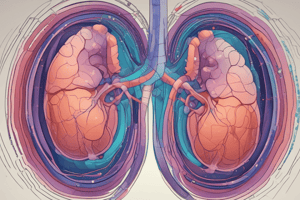Podcast
Questions and Answers
What is the primary function of the kidneys?
What is the primary function of the kidneys?
- Production of vitamin D
- Synthesis of erythropoietin
- Control of blood pressure
- Excretion of waste products (correct)
How many nephrons are present in each kidney?
How many nephrons are present in each kidney?
- 1,500,000
- 500,000
- 750,000
- 1,000,000 (correct)
What is the function of the glomerulus?
What is the function of the glomerulus?
- Synthesis of erythropoietin
- Blood pressure regulation
- Filtration of blood
- Reabsorption and excretion (correct)
What is the function of the tubules?
What is the function of the tubules?
What is the name of the enzyme released by the kidneys into the blood?
What is the name of the enzyme released by the kidneys into the blood?
What is the function of the kidneys in maintaining ECF volume?
What is the function of the kidneys in maintaining ECF volume?
What is the first step in urine formation?
What is the first step in urine formation?
What percentage of filtered material is normally reabsorbed?
What percentage of filtered material is normally reabsorbed?
What is added to the lumen of the kidney from the blood?
What is added to the lumen of the kidney from the blood?
What is the rate of renal blood flow (RBF) in liters per minute?
What is the rate of renal blood flow (RBF) in liters per minute?
What percentage of renal blood flow is directed to the renal medulla?
What percentage of renal blood flow is directed to the renal medulla?
What is the effect of dopamine on renal blood flow?
What is the effect of dopamine on renal blood flow?
Flashcards are hidden until you start studying
Study Notes
Renal Physiology
- The renal system consists of 2 kidneys, 2 ureters, urinary bladder, and urethra.
- Functions of the kidney include excretion of waste products, control of ECF volume, osmolarity, electrolytes, blood pressure, and pH, as well as endocrine functions such as synthesizing erythropoietin, activating vitamin D, and releasing renin enzyme.
Nephron Structure and Function
- The nephron is the functional unit of the kidney, with approximately 1 million nephrons in each kidney.
- Each nephron consists of the glomerulus, tubules, and Bowman's capsule.
- The glomerulus is a tuft of capillaries enclosed within a Bowman's capsule.
- The tubules are specialized for reabsorption and excretion, and include the proximal convoluted tubules (PCT), loop of Henle (LH), distal convoluted tubules (DCT), and collecting duct (CDs).
Functions of the Nephron
- Four main processes occur in the nephron: filtration, reabsorption, secretion, and excretion.
- Filtration is the first step in urine formation, involving the bulk transport of fluid from blood to kidney tubule, resulting in an isosmotic filtrate.
- Reabsorption involves returning filtered material to the bloodstream, with 99% of what is filtered being reabsorbed.
- Secretion involves adding material to the lumen of the kidney from the blood, usually through active transport of toxins and foreign substances.
- Excretion involves the loss of fluid from the body in the form of urine.
Renal Blood Flow
- Renal blood flow (RBF) is approximately 1.2 L/min, which is about 20-25% of the cardiac output.
- RBF is directed mainly to the renal cortex (90%), with only 10% going to the renal medulla.
- RBF is autoregulated, maintaining a constant flow despite changes in mean arterial blood pressure between 80-180 mmHg.
- RBF is affected by sympathetic stimulation, catecholamines, and dopamine.
Studying That Suits You
Use AI to generate personalized quizzes and flashcards to suit your learning preferences.




